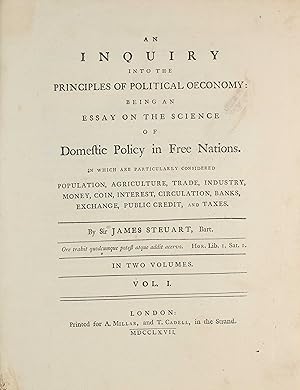About this Item
4to (288 x 227 mm). Two volumes. [2], [v]-xv [1], [12], 639 [1]; [16], 646, [14] pp., including general index and separate errata leaf at end of vol. II, a folding letterpress table to rear of each volume; bound without the initial blank in vol. I as usual. No half-titles are called for and the book was issued without leaf A1 in vol. I, despite the pagination including it. Uniform contemporary polished and sprinkled calf, each spine with 5 raised bands, gilt-lettered morocco labels and gilt ruling, original endpapers (joints expertly repaired, extremities rubbed, corners bumped, boards scratched and soiled, marginal brown staining of endpapers from binder's glue). Custom slipcase. Text crisp, clean and bright throughout, light soiling of first title; folding table in vol. I slightly creased and with short clean tear at foot, pp. 478-9 and 489 of vol. II soiled with printer's ink, small wormtracks at upper and lower blank margin (not affecting text) from p. 630 to the end of vol. II. Provenances: illegible inscription to free endpapers; from a private German collection of economics works. A near fine, wide-margined set, which is accompanied by a bibliography (in German) of this particular work. ---- FIRST EDITION of the most complete and systematic survey of economics from the point of view of moderate mercantilism which can be considered a culmination of economic thought before Adam Smith. "In the Principles, Steuart made notable contributions to economic theory: the historical analysis of the origins of the exchange economy, where he (like Adam Smith) was influenced by David Hume; to the theory of economic development with its emphasis on the importance of interdependent sectors; to the theory of competitive price, and, most notably, to the treatment of money and banking" (ODNB). "Steuart had the misfortune to be followed by Adam Smith in less than a decade. Otherwise [his Inquiry] would probably have served as the standard English economic text" (Carpenter). Its later influence "proved to be most considerable on the continent. During the 1770s the text was translated into German (twice), and into French in 1789. One authority has noted that "until the final decade of the eighteenth century, Sir James Steuart's Inquiry was better known and more frequently cited than Smith's Wealth of Nations" (Tribe, p. 133). References & Bibliography: Blaug, Great Economists before Keynes pp.241-242; Einaudi 1527; Goldsmiths' 10276; Kress 6498; Higgs 3968; Palgrave III, pp.475-476; Schumpeter, History of Economic Analysis p.176; K. Tribe, Governing Economy: The Reformation of German Economic Discourse, 1750-1840. - Visit our website to see more images! Seller Inventory # 003879
Contact seller
Report this item
![]()




